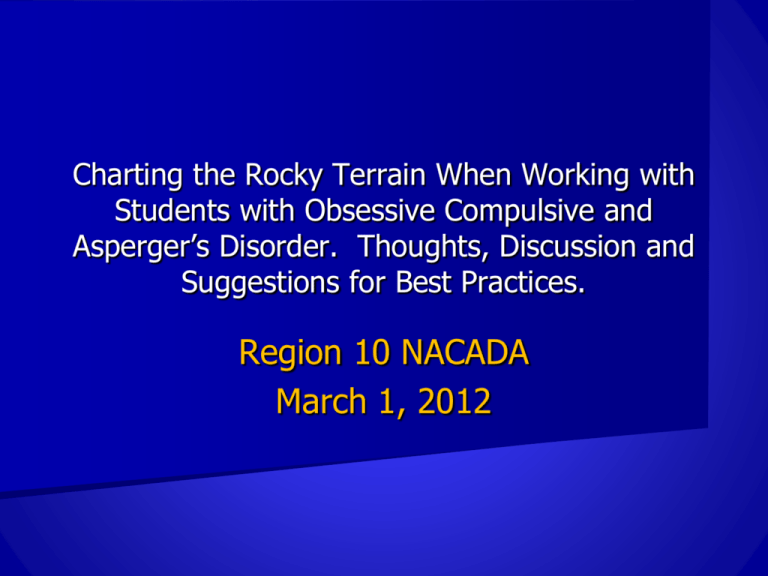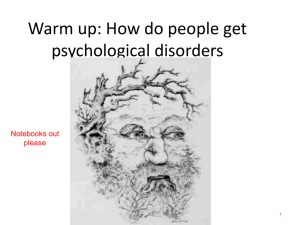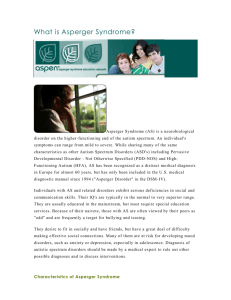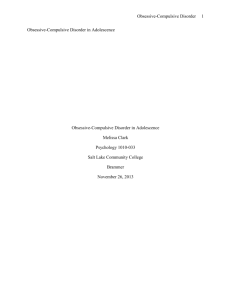PowerPoint presentation
advertisement

Charting the Rocky Terrain When Working with Students with Obsessive Compulsive and Asperger’s Disorder. Thoughts, Discussion and Suggestions for Best Practices. Region 10 NACADA March 1, 2012 Workshop Facilitators Julie Preece Ronald Chapman Norman Roberts Michael Brooks Brigham Young University Provo, Utah Academic_support@byu.edu J “Caveats” Session’s Purpose: To enhance awareness of best advisement practices; not prepare psychological service providers. Psychological disorders are numerous; a review of all disorders is beyond the scope of one workshop. Psychological disorders may vary in their signs and symptoms from person-to-person. Recognition, Reconnaissance, Respect, and Referral (4R’s) help a majority of students experiencing psychological concerns. In the United States, by law, students with disorders that rise to the level of a disability receive reasonable accommodations that do not violate the essential elements of the academic programs. R Session Overview Mental health issues among college age students Cases, discussions, and recommendations: – Asperger’s Disorder – Obsessive-Compulsive Disorder Concluding comments R Minnesota College Students 10,000 randomly selected for survey from 14 higher education institutions 26% had diagnosable mental conditions by self report Comparable Utah sample was 28% R Within the last year… Condition % So depressed, difficult to function Overwhelming anxiety Overwhelming anger Seriously considered suicide Intentionally cut, burned, bruised or injured self R National College Health Assessment/ACHA Fall 2010 (N=30,093) R Within the last year… Condition % So depressed, difficult to function 28.4 Overwhelming anxiety 46.4 Overwhelming anger 36.7 Seriously considered suicide 6.0 Intentionally cut, burned, bruised or injured self 5.1 R National College Health Assessment/ACHA Fall 2010 (30,093) R Have You Ever Had a Student Confide in You Thoughts About Suicide? Suicide 27% 73% Yes No Have You Ever Had A Student Confide In YOU Thoughts About Or Experiences with Other Self Destructive Behaviors Destructive Behavior 29% 71% Yes No Asperger’s Disorder Asperger’s Disorder—”Caveats” It has a variety of presentations and/or degrees! What it is not: – – – – – Just shyness Social awkwardness Social opportunity disadvantage Intellectual impairment Delay of language development N What you may observe? Impairment of social interaction: – – – – use of nonverbal behaviors understanding of ironic language lack of peer relationships lack of emotional reciprocity Repetitive behaviors, interests or actions: – – – – restricted pattern of interests adherence to routines repetitive motor activities preoccupation with parts of an object N Asperger’s Disorder: Advisor Interventions Generally: – – – – no demeaning observations avoid ironic language or expressions avoid jokes or puns appreciate student’s intelligence N Asperger’s Disorder: Advisor Interventions In the office: – focus on one topic at a time – use concrete observations or examples – create specific—but limited in number— assignments or activities to accomplish – write out, together, assignments – arrange for specific follow up – facilitate appropriate behaviors – contact by email N/M I am writing you at the request of a student in your class, STUDENT, who is working with our office and receiving accommodations due to a disabling condition. My hope is that through this letter I can better convey the difficulties STUDENT has had in other classes, and we hope to provide a better and more successful experience for him. The suggestions that follow are not necessarily accommodations, but give a sense of strategies is trying to employ to find success at college. Since social interactions are often more difficult for STUDENT than for other students, this letter format is thought to better convey the concerns and suggestions. One request that STUDENT would make is to have a very brief meeting with you following each class so that he can check out what is due for the next class… Third, STUDENT would greatly appreciate, from time to time, feedback on how he is doing in the course… Finally, due to varying difficulties with social interactions, STUDENT often finds it hard to initiate joining a study group. His performance once in a group has never been a problem, but the nuances of joining a group are difficult. Should a study group be a frequently utilized aspect of your class, any help you could offer STUDENT in helping to join a group would be greatly appreciated . Obsessive-Compulsive Disorder J Obsessive-Compulsive Disorder (OCD) Disorder that may include recurrent and persistent images, thoughts, or impulses which are more than real-life problems (obsessions) and Repetitive behaviors (compulsion), in response to an obsession. An individual usually perceives obsessions as intrusive and inappropriate and the compulsions as excessive and unreasonable. In a given year, approximately 2% of the U.S. population experiences OCD. Both males and females are affected equally, and begin during childhood or adolescence. J Possible OCD Effects Academics and Relationships Concentration: in class, doing homework, in conversations. Excessive time on exams / completing exams within time limits. – Obsess about the “right” answer (content concerns) – Obsess drawing “perfect circles” around the answers – Making all the letters equal on a 1000 word essay test (mechanical concerns) J Possible OCD Effects Academics and Relationships Concentration: in class, doing homework, in conversations. Excessive time on exams / completing exams within time limits. Objects or events stimulate a compulsion affecting focus. Student thought that if he heard a bell (such as at the end of classes), something dreadful would happen. He left class 10 minutes early to get out of buildings so he would not hear a bell. If he heard a bell passing a building, he would panic and be paralyzed for several hours. J Possible OCD Effects Academics and Relationships Concentration: in class, doing homework, in conversations. Excessive time on exams / completing exams within time limits. Objects or events stimulate a compulsion affecting focus Obsession to always say “the correct thing.” – Continually correcting a statement. – Continually apologizing. – Other “speaking” or “interacting” obsessions may lead to other perceiving them as “odd.” J Academic Strategies for Students with OCD Extended time, alternate location with breaks during testing. Oral exams. For students with compulsive writing rituals, consider limiting handwritten work. With Scantron forms: circle answers or record answers directly in the test booklet. Record lectures. Hard copy outline of the lecture notes from instructor. If not a compulsion, student may use a notebook computer to record lecture notes. © 2004, Leslie E. Packer, PhD and Challenging Kids, Inc. This handout may be reproduced for noncommercial personal use. M Academic Strategies for Students with OCD Reading compulsion rituals : limit amount to be read or break it into chunks. If reading rituals and intrusive thoughts are severe: books on tape or recording the material for your student to listen to. In some cases, having someone else read aloud to the student may work, however, older students may feel frustrated and demoralized. © 2004, Leslie E. Packer, PhD and Challenging Kids, Inc. This handout may be reproduced for noncommercial personal use. M Questions and Comments Anyone? N





